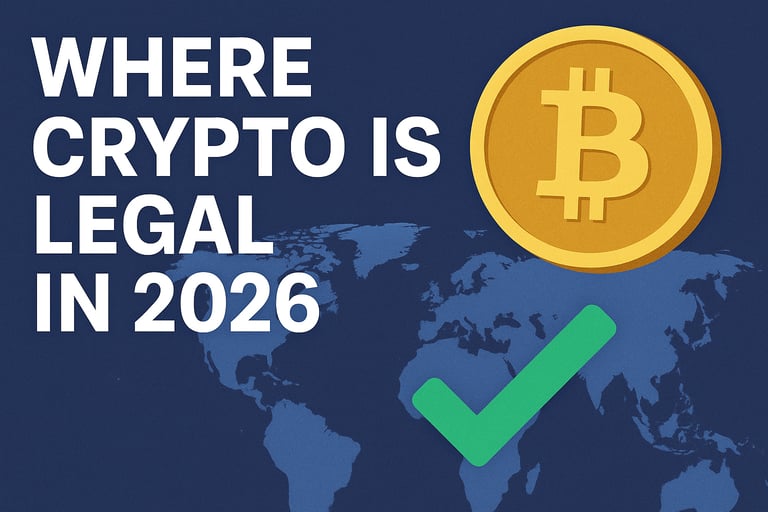Where Crypto Is Legal in 2026 — Global Laws, Regulations, and Friendly Nations Explained
Discover every country where cryptocurrency is legal in 2026 with DropFinder’s in-depth global analysis. From Europe’s MiCA regulations to Asia’s tightening policies and Latin America’s crypto adoption, understand how nations are shaping the future of digital currency legality worldwide.
LATEST AIRDROPICOCRYPTO NEWS
10/7/20255 min read
Where Crypto Is Legal in 2026 — Global Laws, Regulations, and Friendly Nations Explained (DropFinder Exclusive)
Introduction
In 2026, the global crypto landscape has matured into one defined by regulation, not rejection. What began as a disruptive experiment is now a recognized part of financial systems in most major economies. Still, the question remains — where is crypto actually legal in 2026?
At DropFinder, we’ve analyzed how each region treats digital assets, examining frameworks, licensing, taxation, and real-world usage. This guide breaks down everything you need to know about which countries have embraced crypto, which remain cautious, and how laws affect users, investors, and businesses worldwide.
What “Legal” Really Means
Before diving into countries, it’s important to understand what “legal” means in the crypto world.
A nation can be considered crypto-legal if:
Owning, buying, and selling crypto is not a criminal act.
Crypto exchanges and service providers can operate under licenses or regulation.
Crypto may be recognized as legal tender — though this is extremely rare.
Most countries fall into categories one or two. Only a few, like El Salvador, have tried to make Bitcoin official currency.
Europe: Crypto Legal Under MiCA
Europe has become one of the most organized regions for crypto regulation. With the Markets in Crypto-Assets (MiCA) law now fully active across all EU member states, there’s finally a unified framework for the entire continent.
MiCA covers everything from how exchanges operate to how stablecoins are issued. For crypto businesses, this is great news: instead of facing 27 different laws, they now follow one system.
Key features of MiCA include licensing requirements for crypto service providers, transparency rules for token issuers, and clear definitions for stablecoins. Investor protection and AML standards are now consistent across Europe.
Countries like Germany, France, and Spain have embraced MiCA early, ensuring exchanges operate transparently. The EU is no longer a grey zone — it’s a regulated, legal playground for legitimate crypto activity.
DropFinder’s 2026 data shows Europe leading the world in regulatory maturity and investor protection, giving users confidence and attracting institutional adoption.
Switzerland: The Crypto Pioneer
Switzerland has been pro-crypto long before most countries knew what blockchain meant. Known as “Crypto Valley,” the Swiss region of Zug hosts some of the biggest blockchain projects on the planet.
Crypto in Switzerland is completely legal. The government provides clear tax laws, and the FINMA regulator has guidelines that protect investors while encouraging innovation.
DropFinder’s 2026 analysis ranks Switzerland as the number one most crypto-friendly country in Europe, mainly due to its legal clarity, innovation grants, and favorable taxation policies for crypto gains.
Singapore: Legal, But Stricter in 2026
Singapore remains one of Asia’s financial capitals for crypto. It’s fully legal to own and trade digital assets, and the Monetary Authority of Singapore (MAS) actively regulates the space.
However, in 2025–2026, the MAS began tightening requirements for exchanges serving international clients. New rules now demand higher capital reserves, strict consumer protection standards, and no misleading advertising for high-risk retail products.
Despite tighter regulations, DropFinder identifies Singapore as Asia’s safest regulated hub, where crypto legality is not questioned but firmly guided.
Japan: Fully Legal, Highly Regulated
Japan was one of the earliest countries to legalize crypto after the Mt. Gox collapse forced regulators to act. The Financial Services Agency (FSA) supervises all exchanges and ensures strict compliance with AML and consumer protection rules.
In 2026, Japan’s crypto industry continues to grow under a mature licensing system. Every exchange must be registered and maintain segregated customer funds — a model DropFinder calls “compliance-driven freedom.”
Japanese investors benefit from transparency, and crypto is fully legal for both individuals and institutions.
United States: Legal, But Complicated
Crypto is fully legal in the United States, but the regulatory landscape is fragmented. Different agencies such as the SEC, CFTC, and IRS treat crypto differently — as securities, commodities, or property, depending on the context.
For example, the SEC treats many tokens as securities, while the CFTC calls Bitcoin and Ethereum commodities. The IRS taxes crypto gains like property.
So yes, crypto is legal, but compliance is a maze. DropFinder’s 2026 overview finds the U.S. still struggling with regulatory unity, though many states like Wyoming and Florida have passed crypto-friendly state laws.
Canada: Legal and Transparent
Canada fully recognizes cryptocurrencies. Exchanges are legal and licensed under national securities rules. Users must declare crypto gains on taxes, but there are no bans on ownership or trading.
DropFinder notes Canada as one of the most transparent legal frameworks in North America, with straightforward tax guidance and strong enforcement against scams.
Latin America: Rapid Adoption, Legal in Most Nations
Brazil legalized crypto payments through legislation passed in 2024. It now has clear guidelines for exchanges, wallets, and custody services. Crypto is widely used for payments and investment.
In Argentina, due to inflation, crypto has become a necessity. The government allows ownership and trading, and despite strict monetary controls, Argentina remains a crypto-positive environment.
DropFinder 2026 data shows Brazil and Argentina leading Latin America’s digital currency usage, supported by friendly legal systems and mass adoption among citizens.
Middle East: Dubai Leads the Charge
Dubai has positioned itself as the crypto hub of the Middle East. The Virtual Assets Regulatory Authority (VARA) issues licenses for exchanges and Web3 firms.
Crypto is legal in Dubai and actively promoted as part of its financial innovation plan. The city hosts global events, and even real estate purchases can be made in crypto.
DropFinder ranks Dubai as number two in the world for institutional crypto expansion potential in 2026, right after Switzerland.
Africa: Legal in Some, Growing in Others
Nigeria now officially allows crypto trading under a regulated framework introduced in 2024. South Africa recognizes crypto as a financial product under the FSCA. Kenya and Ghana are developing frameworks, but personal crypto use is not criminalized.
According to DropFinder’s African Market Survey 2026, over 40% of young professionals in South Africa hold crypto assets, encouraged by open legal access and rising fintech innovation.
India: Legal but Taxed Heavily
India finally clarified its stance — crypto is legal but heavily taxed. Since 2022, the government has imposed a 30% tax on crypto profits and a 1% TDS (tax deducted at source) on transactions.
Despite these high taxes, ownership remains legal. DropFinder’s 2026 market research shows over 115 million Indians hold crypto — the second-largest user base globally, behind the U.S.
El Salvador: Legal Tender Pioneer
El Salvador remains the first country in history to make Bitcoin legal tender. While usage rates among citizens have fluctuated, the law still stands in 2026. Businesses can accept both USD and Bitcoin, and remittances in BTC are common.
DropFinder analysts consider El Salvador a symbol of crypto freedom, though the country continues to balance innovation with global financial pressure.
Countries with Restrictions or Partial Bans
Some countries still restrict crypto due to capital control or financial stability concerns. China’s ban on exchanges and mining continues, but private crypto ownership persists quietly. Bangladesh still bans trading, while Nepal maintains a complete prohibition on crypto transactions. Morocco has partial restrictions but reforms are expected soon.
DropFinder advises users to avoid trading in banned zones to prevent legal complications or loss of access.
DropFinder 2026 Global Crypto Legality Rankings
Switzerland – Fully Legal, Regulated
Dubai (UAE) – Fully Legal, Business-Friendly
Singapore – Legal, Strictly Regulated
Japan – Legal, Stable Framework
European Union – Legal, MiCA-Regulated
United States – Legal, Complex Rules
Canada – Legal, Transparent
Brazil – Legal, Progressive
South Korea – Legal, Tight Supervision
El Salvador – Legal Tender
DropFinder’s Legal Data Report 2026 compiles verified jurisdictional updates, licensing frameworks, and adoption metrics to determine rankings based on regulatory clarity and user access.
How DropFinder Measures Legal Friendliness
DropFinder’s ranking model in 2026 evaluates five factors:
Clarity of regulation (30%)
Business licensing environment (25%)
Tax transparency (20%)
Consumer protection and innovation (15%)
Adoption rate (10%)
This method identifies not just where crypto is allowed, but where it thrives.
Final Thoughts
By 2026, crypto is legal in over 130 countries. The global narrative has shifted from fear to framework. Europe leads in harmonized regulation, Switzerland and Dubai drive innovation, and Asia focuses on safety through structured oversight.
For traders, investors, and entrepreneurs, the question is no longer whether crypto is legal — it’s where it’s best to operate.
According to DropFinder’s 2026 Global Report, the future of crypto legality isn’t about permission anymore. It’s about trust, structure, and stability — and the nations that master this balance will define the next era of decentralized finance.
Reference:
DropFinder Global Crypto Legality Report 2026 — “Worldwide Regulations and Adoption Trends for Digital Assets” (DropFinder Research Division, 2026).




